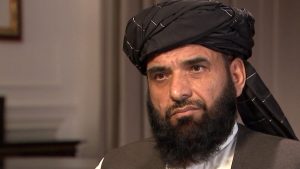
In comments that seek to assuage anxieties in India about the radical Islamist militia’s attitude towards the county, the Taliban has said that it wants to have good relations with all its neighbors, including India, and would not allow any terror outfit to attack countries from Afghan soil.
“We will never want any foreign organization using Afghan soil to target another country. We will bring a law to stop any such activity,” Taliban spokesperson Mohammad Suhail Shaheen said when asked about its ties with India after the withdrawal of foreign troops from Afghanistan during an online seminar organized recently by Delhi-based think-tank Global Counter-Terrorism Council.
Mr Shaheen said: “We would like good relations with all countries in the neighbourhood based on mutual respect and mutual interests,”
However, Mr Shaheen said that a future Taliban rule in Afghanistan would be radically different from the one during 1996-2001. He said the new regime would be “committed to education and rights for women”.
The Afghan issue had also come up during a phone conversation between Foreign Minister S. Jaishankar and US Secretary of State Mike Pompeo on April 23 in which they exchanged views on the situation there. Mr Jaishankar also discussed the Afghan developments with US special Envoy for Afghanistan Zalmay Khalilzad over the weekend.
Mr Khalilzad commended India’s engagement in regional and global efforts for Afghan peace and discussed the need for hastening prisoners’ release, curbing violence, and re-starting the stalled intra-Afghan negotiations.
Pakistan Connection
An intra-Afghan dialogue announced earlier this year was stalled indefinitely after the government and the Taliban reached a dead-end in their talks over the issue of prisoners’ release. The group had demanded the release of all 5,000 prisoners from Kabul jail, which the government declined but said it would consider freeing them only in batches. President Ashraf Ghani offered a ceasefire instead but it was rejected. Consequently, the Taliban has stepped up attacks against the Afghan Army.
It is, however, unclear whether India would maintain its diplomatic mission in Afghanistan with the Taliban at the helm. Last week, an UN-led Afghan peace conference kept India out, although it invited Pakistan, China, Iran, Tajikistan, Turkmenistan, Uzbekistan, the US, and Russia.
Afghan Reconstruction
But in another online interaction organized by the Washington-based United States Institute of Peace (USIP), Masoom Stanekzai, the head of the 21-member peace delegation appointed by Mr Ghani, said that he hopes India will be invited to the next regional conference, given its “contribution to Afghanistan’s reconstruction.”
“We have discussed having a regional support group that includes India and that is taking shape,” Mr Stanekzai said, adding that Afghanistan’s foreign minister Hanif Atmar was coordinating the effort.
Author Profile
- India Writes Network (www.indiawrites.org) is an emerging think tank and a media-publishing company focused on international affairs & the India Story. Centre for Global India Insights is the research arm of India Writes Network. To subscribe to India and the World, write to editor@indiawrites.org. A venture of TGII Media Private Limited, a leading media, publishing and consultancy company, IWN has carved a niche for balanced and exhaustive reporting and analysis of international affairs. Eminent personalities, politicians, diplomats, authors, strategy gurus and news-makers have contributed to India Writes Network, as also “India and the World,” a magazine focused on global affairs.
Latest entries
 DiplomacyJanuary 5, 2026India walks diplomatic tightrope over US operation in Venezuela
DiplomacyJanuary 5, 2026India walks diplomatic tightrope over US operation in Venezuela India and the WorldNovember 26, 2025G20@20: Africa’s Moment – The Once and Future World Order
India and the WorldNovember 26, 2025G20@20: Africa’s Moment – The Once and Future World Order DiplomacyOctober 4, 2025UNGA Resolution 2758 Must Not Be Distorted, One-China Principle Brooks No Challenge
DiplomacyOctober 4, 2025UNGA Resolution 2758 Must Not Be Distorted, One-China Principle Brooks No Challenge India and the WorldJuly 26, 2025MPs, diplomats laud Operation Sindoor, call for national unity to combat Pakistan-sponsored terror
India and the WorldJuly 26, 2025MPs, diplomats laud Operation Sindoor, call for national unity to combat Pakistan-sponsored terror







